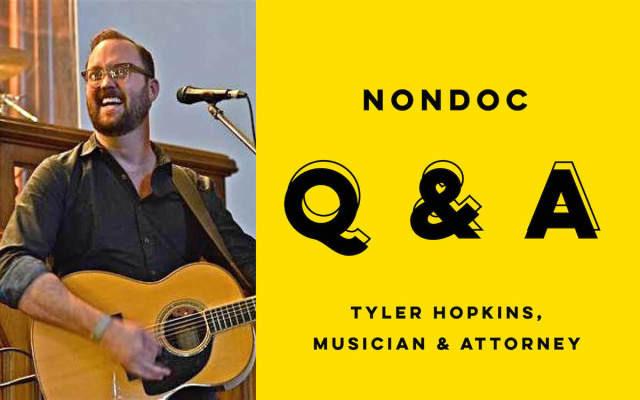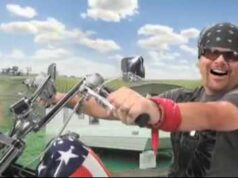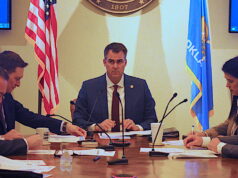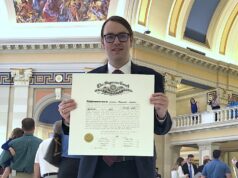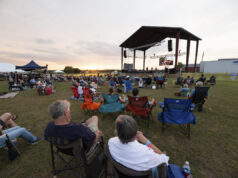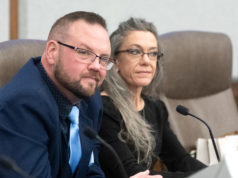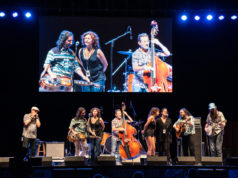Tyler Hopkins has been attending concerts and performing music throughout central Oklahoma since he was a student at Oklahoma State.
While he ultimately became an attorney by trade, Hopkins has been invested in the local music scene and has been eager to see it grow. The metro area has always had an abundance of musical talent, and its live music scene has recently begun to expand with the opening of new venues and opportunities.
Back in 2014, Hopkins decided to jump into that process and found the Midtown Songwriter Series, a quarterly concert featuring local artists performing at City Pres, a worship space turned intimate venue in downtown Oklahoma City. Its next installment will be Saturday and features Elms, Student Film and Young Weather.
Below, Hopkins discusses how he became involved in the OKC music scene and how the Midtown Songwriter Series fits in. Responses have been lightly edited for style.
Tell us about your background. Growing up, did it seem more likely that you’d be a lawyer or a musician?
I don’t know if it seemed likely that I would be either a lawyer or a musician growing up. I played the trombone in seventh and eighth grade but traded it in for a guitar once I started high school. I mainly played at church and with my friends, but I never really considered music as a career. I ended up majoring in English at Oklahoma State, and that was when I began to write songs. In the English department, I took creative writing courses, including workshops in poetry, fiction writing and screenwriting. This is when I discovered a love for writing, which I imagine is the tie that binds my musical pursuits and legal career. But it has been a long road to where I am now. I graduated college at 22, but I didn’t start law school until I was 29. In the years between, I taught overseas, worked in sales, worked for several years as a landman and waited a lot of tables.
How were you introduced to the local music scene? How did your band, The Rebellion, get started?
I was introduced to the local music scene in college, attending a lot of shows in Norman, Stillwater and everywhere else within driving distance. After college, I began to play a lot of solo shows as well as play bass with a few bands. Being a bass player has helped me develop a lot of relationships in the music scene because I get asked to fill in with a lot of different groups. And then it’s easy to occasionally jump up on stage with an acoustic guitar and be the opener. Although I’ve played with dozens of bands over the years, I didn’t assemble a band for my own songs until 2012. I recorded an album with Riley Jantzen (Mayola, Black Canyon, Riley Jantzen & The Spirits) in 2011, and that gave me the ability to start booking shows as a full band.
Tell us about how the Midtown Songwriter Series got started. What is its history, and what have been its unique challenges and rewards so far?
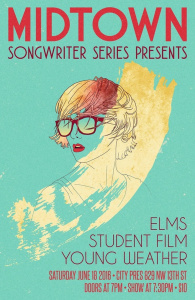
I started the Midtown Songwriter series in 2014 to provide a venue and format that allowed songwriters to share their songs with an engaged audience. The idea grew out of a conversation with friends and fellow songwriters Beau Jennings and Chase Kerby. We were discussing alternatives to the few venues in OKC, which were mostly noisy, smoky bars where the earliest start time for a show would be 10 p.m. Then, I heard that a local church congregation had purchased the old Mayflower Congregational Church in Midtown. I was friends with Bobby Griffith, one of the pastors, and I approached him about their church hosting a concert series. He immediately said yes and offered to provide free beer for the show, which was too good of an offer to pass up.
Honestly, the biggest challenge has been getting the word out about the show. Part of this may be due to the fact that we are a quarterly series, which means we only have events every three months. But the advantage of this is that we have the time to make each show a quality experience. The size of the audience ranges from around 75 to 150, but the room can hold around 250. The atmosphere is still very intimate, regardless of the size of the crowd, but everyone who comes to each show acknowledges that the series is something truly unique, where artists and audiences can connect in a way that doesn’t happen at most other venues.
How have local musicians and audiences responded to the series?
We have had a very positive response from musicians and audiences because their experience is our sole focus. The Midtown Songwriter Series is currently a not-for-profit endeavor. I now have a team of people who help organize the event, but none of us makes any money from the shows. We charge $10 at the door, but since the church provides the venue for free, we can pass on all of the profits to the performers. It is important to us that the artists are paid as well as we can pay them because artists are too often taken advantage of by promoters and venue owners. I believe this approach has created an atmosphere where the artists and audience all have a sense of ownership in the event. And this has resulted in some of our shows with the lowest attendance being some of the most meaningful for everyone involved. But it is nice to put a good wad of cash in a songwriter’s hand at the end of the night because I know for a fact that many venues will not give them near that amount even if the crowd is twice the size.
What is the future of the series and the OKC music scene generally? How can the series be part of that future?
We are currently working to secure partnerships with local businesses to help us bring in bigger acts. The downside to currently being a not-for-profit event means that we don’t have a pool of money to offer touring acts as a guarantee. For instance, I’ve been playing shows with John Moreland since 2006; but because his career has (thankfully) taken off recently, we can’t currently afford the guarantee his management requires. However, we’re hoping to change this by securing partnerships with like-minded companies who value supporting the arts in our city.
Oklahoma City’s music scene is currently going through some big changes. Several new venues, like the Criterion, are opening and some bars, like The Speakeasy, are committing more nights to live music. This will solve the shortage of venues that the local music scene has had for many years. But the other problem is the inconsistency of turnout for shows. My hope is that the Midtown Songwriter Series will continue to get people out of their homes to hear live music and hopefully add to what all of the other venues and independent music series are currently doing. Oklahoma City has had a wealth of talented musicians and bands for quite a while, but we are just now getting to a point where we have a larger selection of quality venues for live music.
What is it like to balance your job as an attorney and your passion as a musician? Do you find that the two complement each other in any way?
There is a notion that, to be a real artist, you must sacrifice everything in order to pursue your craft. Although I think it is true that to have a career in the arts you must fully devote yourself to that pursuit, I don’t think the professional artist is the only true artist. In my lit classes in college, I was struck by how many American writers were also professionals in other fields. The poet William Carlos Williams was a physician. His contemporary, Wallace Stevens, won a Pulitzer Prize while also working as an insurance executive. Many artists have interests aside from their craft, and they do not need to push out everything else in order to devote themselves to creative pursuits.
I love the process of songwriting, and I love playing in bands, but I have little desire to be a touring musician. I also enjoy the challenge of practicing law, and being a new associate in the world of litigation is very demanding. But luckily I play with groups of other musicians who are past the days of five-hour jam sessions that produce one or two songs. I don’t have the time or patience for that any more. For me, practicing law during the day and playing music on nights and weekends makes sense. It may not make sense for someone else, but there’s nothing wrong with that. I have friends who tour as much as they can and wait tables or work odd jobs when they are in town. And there is absolutely nothing wrong with that. My brain is challenged in different ways by both my legal career and playing music and I enjoy those challenges. But at the end of the day, whether I’m with my friends or alone on my porch, the process of writing and playing music offers a cathartic release to the stresses of the day. And it is important for my personal happiness to continue to keep music as a part of my life.
If your life was a song, what would that be?
Oh wow, I don’t know if I have an answer to that. I rarely write autobiographical songs primarily because I think real life is often too boring. If there was a song that summed up my life, I may wind up skipping to the next track.
(Editor’s Note: NonDoc cartoonist Mike Allen serves as art director for the Midtown Songwriters’ Series.)









